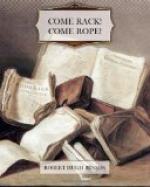Robert Hugh Benson.
Feast of the Blessed Thomas More, 1912. Hare Street House, Buntingford.
PART I
CHAPTER I
I
There should be no sight more happy than a young man riding to meet his love. His eyes should shine, his lips should sing; he should slap his mare upon her shoulder and call her his darling. The puddles upon his way should be turned to pure gold, and the stream that runs beside him should chatter her name.
Yet, as Robin rode to Marjorie none of these things were done. It was a still day of frost; the sky was arched above him, across the high hills, like that terrible crystal which is the vault above which sits God—hard blue from horizon to horizon; the fringe of feathery birches stood like filigree-work above him on his left; on his right ran the Derwent, sucking softly among his sedges; on this side and that lay the flat bottom through which he went—meadowland broken by rushes; his mare Cecily stepped along, now cracking the thin ice of the little pools with her dainty feet, now going gently over peaty ground, blowing thin clouds from her red nostrils, yet unencouraged by word or caress from her rider; who sat, heavy and all but slouching, staring with his blue eyes under puckered eyelids, as if he went to an appointment which he would not keep.
Yet he was a very pleasant lad to look upon, smooth-faced and gallant, mounted and dressed in a manner that should give any lad joy. He wore great gauntlets on his hands; he was in his habit of green; he had his steel-buckled leather belt upon him beneath his cloak and a pair of daggers in it, with his long-sword looped up; he had his felt hat on his head, buckled again, and decked with half a pheasant’s tail; he had his long boots of undressed leather, that rose above his knees; and on his left wrist sat his grim falcon Agnes, hooded and belled, not because he rode after game, but from mere custom, and to give her the air.
He was meeting his first man’s trouble.
Last year he had said good-bye to Derby Grammar School—of old my lord Bishop Durdant’s foundation—situated in St. Peter’s churchyard. Here he had done the right and usual things; he had learned his grammar; he had fought; he had been chastised; he had robed the effigy of his pious founder in a patched doublet with a saucepan on his head (but that had been done before he had learned veneration)—and so had gone home again to Matstead, proficient in Latin, English, history, writing, good manners and chess, to live with his father, to hunt, to hear mass when a priest was within reasonable distance, to indite painful letters now and then on matters of the estate, and to learn how to bear himself generally as should one of Master’s rank—the son of a gentleman who bore arms, and his father’s father




